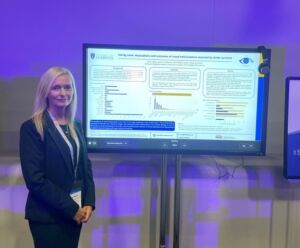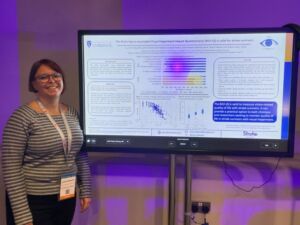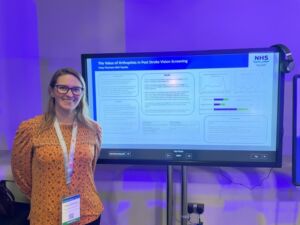The UK Stroke Forum is the UK’s largest multidisciplinary conference for stroke care professionals. It lasts three days and consists of a large selection of exhibitors, lectures, parallel streams and workshops. This year the conference was held in the Birmingham International Conference Centre from 4th to 6th December 2023.
The event began with ‘Singing Medicine’, a project aiming to bring wellbeing to patients in hospital through the media of singing. It was an interesting start to the Stroke Forum, especially as they requested audience participation! The remainder of the session highlighted inequities and discussed the challenges in researching and addressing them.
In the exhibition hall there were various stalls that participants could visit between sessions. There were many visitors to the BIOS stall, with members of the BIOS Stroke and Neuro Rehab Clinical Advisory ready to answer any questions. There was also a poster exhibition. In a bid to become more eco friendly the research posters were held in a virtual display that participants could browse at any time. The posters were shown on screens rather than printed. There were posters from myself, Dr Claire Howard, Prof Fiona Rowe and Dr Lauren Hepworth included in this exhibition as seen below.

Dr Claire Howard
“Return to driving after stroke under the exceptional cases rule for hemianopia: Lessons learnt”

Professor Fiona Rowe
“Seeing more: Associations and outcomes of visual hallucinations reported by stroke survivors”

Dr Lauren Hepworth
“The Brain Injury associated Visual Impairment Impact Questionnaire (BIVI-IQ) is valid for stroke survivors”

Tracy Thomson
“The value of orthoptists in post stroke vision screening”
The Forum had lots of sessions to choose from over the three days. Participants were able to attend these in person and also watch the session recording back when uploaded to the app. Nothing would be missed! A key session for orthoptists was ‘the impact of post-stoke visual impairment: what is the impact and things that could help’, highlighted to the stroke multidisciplinary team the impact post stroke visual impairment has for stroke survivors during rehabilitation and life after stroke. Speakers included two stroke survivors detailing their personal experience of living with post-stroke visual field loss. They discussed the emotional aspect, the physical aspect and the significant change to day to day life. They also talked about the mental impact of delayed diagnosis, the stages of grief/acceptance as their life had changed so dramatically following stroke. Dr Lauren Hepworth reported results from the Impact of Visual Impairment II (IVIS II) study. The results showed 93% of patients suffered from reduced quality of life due to their post-stroke visual impairment and the impact could last beyond 6 months. The presentation highlighted the significant and, potentially long term impact post-stroke visual impairment can have. Stevie Johnson talked about the support RNIB can offer people with visual impairment. Eye clinic liaison officers (ECLO’s) are available in many eye clinics and can be priceless colleagues when emotional and practical support is required. They help patients to understand and come to terms with their personal eye journey; from initial diagnosis to long term outcomes and adaptations. Vision also cropped up in workshop titled ‘hands on skills for the front door/A&E’.
The visual perception parallel session included a stroke survivor’s view of visual neglect. Dr Kathleen Vancleef launched the new Oxford Visual Perception Screen (OxVPS), which was launched at the Forum. It is designed to be an aphasia friendly, quick assessment used to diagnose a range of conditions for patients with various abilities. Dr Christine Hazelton talked about interventions and evidence of clinical compensation and restitution recommendations for visual perception rehabilitation. Other speakers covered research on portable, computerised tools for screening and research evidence for the psychological impact of stroke – neglect being a part of this spectrum.
The afternoon of day 2 saw Professor Fiona Rowe take the stage for the prestigious Princess Margaret Memorial Lecture. Professor Rowe stood in front of 1500 UKSF delegates and spoke about the history of research for vision and stroke. Her lecture, titled ‘A vision for vision’, highlighted the previous lack of evidence for vision impairment in stroke. There was an unmet need to assess the type of vision impairment in stroke patients and what treatment options are available for these patients. Professor Rowe has been a champion for orthoptic involvement in stroke for many years. Her lecture was set out as a timeline of the steps taken, alongside many other dedicated professionals, to provide an evidence base for vision in stroke. It was awe inspiring and certainly shone a light on orthoptists and what we can achieve for stroke patients. Hopefully many stroke multidisciplinary teams are now considering the benefit an orthoptic contribution could have to their own stroke services.

Professor Fiona Rowe and her “A Vision for Vision” Princess Margaret Memorial Lecture
Overall, the 2023 UKSF was a huge success with a bumper programme of vision! The next UKSF is from 3rd to 5th December 2024 in Liverpool and is worth attending for any orthoptists working with a stroke caseload.
Tracy Thomson, Stroke lead, NHS Tayside
Find out more about our Stroke & Neuro Rehab group here.